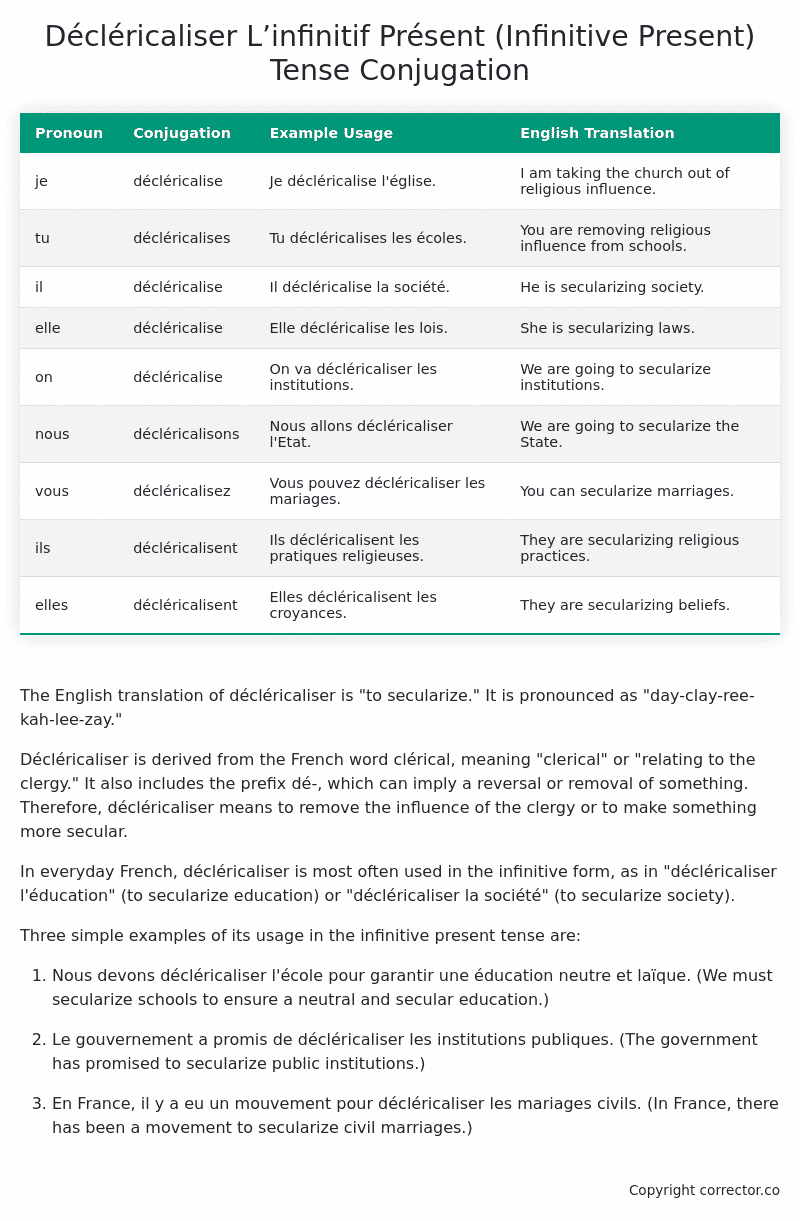L’infinitif Présent (Infinitive Present) Tense Conjugation of the French Verb décléricaliser
Introduction to the verb décléricaliser
The English translation of décléricaliser is “to secularize.” It is pronounced as “day-clay-ree-kah-lee-zay.”
Décléricaliser is derived from the French word clérical, meaning “clerical” or “relating to the clergy.” It also includes the prefix dé-, which can imply a reversal or removal of something. Therefore, décléricaliser means to remove the influence of the clergy or to make something more secular.
In everyday French, décléricaliser is most often used in the infinitive form, as in “décléricaliser l’éducation” (to secularize education) or “décléricaliser la société” (to secularize society).
Three simple examples of its usage in the infinitive present tense are:
-
Nous devons décléricaliser l’école pour garantir une éducation neutre et laïque. (We must secularize schools to ensure a neutral and secular education.)
-
Le gouvernement a promis de décléricaliser les institutions publiques. (The government has promised to secularize public institutions.)
-
En France, il y a eu un mouvement pour décléricaliser les mariages civils. (In France, there has been a movement to secularize civil marriages.)
Table of the L’infinitif Présent (Infinitive Present) Tense Conjugation of décléricaliser
| Pronoun | Conjugation | Example Usage | English Translation |
|---|---|---|---|
| je | décléricalise | Je décléricalise l’église. | I am taking the church out of religious influence. |
| tu | décléricalises | Tu décléricalises les écoles. | You are removing religious influence from schools. |
| il | décléricalise | Il décléricalise la société. | He is secularizing society. |
| elle | décléricalise | Elle décléricalise les lois. | She is secularizing laws. |
| on | décléricalise | On va décléricaliser les institutions. | We are going to secularize institutions. |
| nous | décléricalisons | Nous allons décléricaliser l’Etat. | We are going to secularize the State. |
| vous | décléricalisez | Vous pouvez décléricaliser les mariages. | You can secularize marriages. |
| ils | décléricalisent | Ils décléricalisent les pratiques religieuses. | They are secularizing religious practices. |
| elles | décléricalisent | Elles décléricalisent les croyances. | They are secularizing beliefs. |
Other Conjugations for Décléricaliser.
Le Present (Present Tense) Conjugation of the French Verb décléricaliser
Imparfait (Imperfect) Tense Conjugation of the French Verb décléricaliser
Passé Simple (Simple Past) Tense Conjugation of the French Verb décléricaliser
Passé Composé (Present Perfect) Tense Conjugation of the French Verb décléricaliser
Futur Simple (Simple Future) Tense Conjugation of the French Verb décléricaliser
Futur Proche (Near Future) Tense Conjugation of the French Verb décléricaliser
Plus-que-parfait (Pluperfect) Tense Conjugation of the French Verb décléricaliser
Passé Antérieur (Past Anterior) Tense Conjugation of the French Verb décléricaliser
Futur Antérieur (Future Anterior) Tense Conjugation of the French Verb décléricaliser
Subjonctif Présent (Subjunctive Present) Tense Conjugation of the French Verb décléricaliser
Subjonctif Passé (Subjunctive Past) Tense Conjugation of the French Verb décléricaliser
Subjonctif Imparfait (Subjunctive Imperfect) Tense Conjugation of the French Verb décléricaliser
Conditionnel Présent (Conditional Present) Tense Conjugation of the French Verb décléricaliser
Conditionnel Passé (Conditional Past) Tense Conjugation of the French Verb décléricaliser
L’impératif Présent (Imperative Present) Tense Conjugation of the French Verb décléricaliser
L’infinitif Présent (Infinitive Present) Tense Conjugation of the French Verb décléricaliser (this article)
Struggling with French verbs or the language in general? Why not use our free French Grammar Checker – no registration required!
Get a FREE Download Study Sheet of this Conjugation 🔥
Simply right click the image below, click “save image” and get your free reference for the décléricaliser L’infinitif Présent tense conjugation!

Décléricaliser – About the French L’infinitif Présent (Infinitive Present) Tense
Forming the Infinitive Present
Common Everyday Usage Patterns
As a Verb’s Dictionary Form
After Modal Verbs
As an Imperative
In Infinitive Clauses
Interactions with Other Tenses
Present Tense
Future Tense
Conditional Tense
Passé Composé
Imperfect Tense
Subjunctive and Conditional Moods
Summary
Want More?
I hope you enjoyed this article on the verb décléricaliser. Still in a learning mood? Check out another TOTALLY random French verb conjugation!


